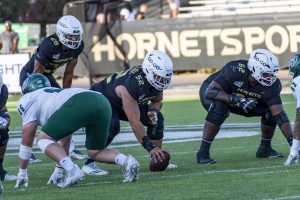Amazon lockers removed at the request of UEI
December 2, 2014
The Amazon Locker installed in the University Union was removed Friday Nov. 21 after two months in service to avoid infringing on a contract between University Enterprises Inc. and the operator of the Hornet Bookstore.
The bank of bright yellow lockers, placed outside the Game Room on Sept. 18, was part of Amazon Locker, a parcel-delivery service run by the online retailer.
“Originally it was put in as a service to students … to have a convenient place to get their packages,” Union director Dean Sorenson said.
Instead of having a package delivered to a home address, Amazon customers can select a Locker location where they want to pick it up. Customers then receive an email with a pick-up code. Upon arriving to collect the package, customers enter the code or scan a barcode, which opens the locker holding the parcel.
Customers have three business days to retrieve packages delivered to Lockers.
Sorenson said the Locker was removed at the request of University Enterprises Inc., or UEI, which operates the Union eateries and has contracted with Follett Corp. to run the Hornet Bookstore.
The contract “provides Follett with exclusivity for bookstore services on campus,” Angela Rader, director of marketing services for UEI, said in an email.
As Amazon sells textbooks and other merchandise traditionally offered by the Bookstore, Rader wrote allowing Amazon to have an on-campus distribution point ran counter to the Follett contract.
UEI notified the Union of its concerns in October.
Sorenson said the Locker was very popular, receiving upwards of 80 packages per week.
“It was successful in the sense that it was clearly a service that students and other members of the campus community took advantage of,” Sorenson said.
Among those students was business major Allen Mortensen, who lives in an apartment a few miles off campus.
Mortensen, treasurer for the Secular Student Alliance, bought two books from Amazon written by a guest speaker the group hosted. He said the Locker was helpful because, in an apartment complex, he has trouble getting packages delivered to his door.
“And so, just to know that I can order something and it will be there when I’m there and I don’t have to worry about driving to a very special depot or whatever, it’s really nice,” Mortensen said.
Mortensen said he missed the convenience of the Locker and felt fair competition wasn’t being allowed.
Rader wrote the problem related specifically to having a distribution facility for a company that sells traditional Bookstore products.
“If a company focused on shipping rather than sales were to propose a drop-off point, that would not be an issue,” Rader wrote.
Sorenson said the Union is looking for a replacement service that avoids the contractual problems of the Amazon Locker and, as an example, brought up UPS, which is testing lockers like Amazon’s in the Chicago area.
The competition between campus bookstores and e-retailers works along several dimensions. Those include practical considerations like pricing and having materials when students need them and less tangible ones like connection to the community.
Mortensen said he buys textbooks mainly from Amazon and Half.com, an eBay subsidiary, because he finds them to have the better prices, but goes to the Bookstore when he can’t find the right textbook online.
“The Bookstore usually always has, you know, not the best prices, but they usually have it,” Mortensen said.
Jim Ontiveros, manager of the Hornet Bookstore, said in an email the Bookstore can make sure students get the right materials because of its direct connection to faculty.
He also touted the Bookstore’s alternative purchase options, such as rental and used books, and the store’s job opportunities and scholarships as reasons to buy there.
The Amazon Locker in the Union was the only one in Sacramento. With its removal, the nearest Lockers are located at UC Davis, which has installed five.























































































































